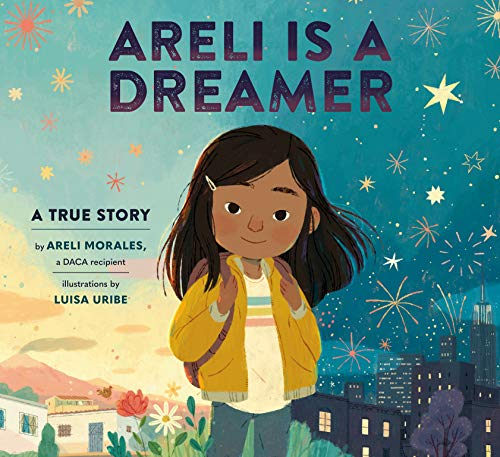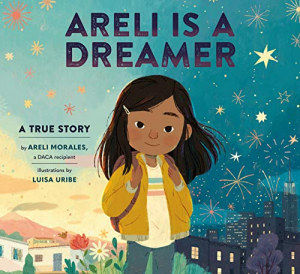

Areli Morales titled Areli Is A Dreamer./ Random House
Studios
To be a Dreamer in the United States is to carry a story of two homes – the one you were born in and the distant place where you settled for a better life. For Brooklyn College alumna Areli Morales, her earliest childhood memories are filled with sights of aging volcanoes in her native Puebla, Mexico, and Brooklyn’s concrete cityscape. Through her debut children’s book, Areli Is A Dreamer, she recounts her adventures, challenges, and lessons as a young undocumented immigrant navigating through the American Dream.
“Growing up, I didn’t see myself in books,” Morales told the Vanguard. “And I hope that my book inspires other immigrants to come out and share their stories. I think our stories are worth sharing and hearing, and I think they’re worth being documented.”
As an undergrad at BC studying childhood bilingual education, Morales landed an offer to publish her own children’s book with Random House Studio, a publisher that was previously looking for DACA stories to create an anthology. Three years later, working with literary agent Brenda Bowen, and illustrator Luisa Uribe, Morales’early life will be in print and sewn into book spines on June 8 at just 24 years old.
“It was just the time for me to reflect on my experience as a child,” she said.
Before graduating BC in 2018, Morales was incredibly outspoken about her status after becoming DACAmented. But before DACA, she was fearful of sharing her birthplace with those around her, a fear she says is all too common for immigrants who run the risk of deportation or family separation.
“People would say, ‘You look Mexican.’ Because I have dark skin, black hair. And they would sometimes assume that I wasn’t from here,” Morales said. She recalled one particular incident where a classmate called her “illegal,” which prompted her younger self to not speak of her background.
“I was afraid to tell people I was from Mexico because I thought they would assume that I was undocumented and that they wouldn’t even care to ask, but automatically assume that I didn’t belong here,” said Morales.
Areli Is A Dreamer starts before Morales’ arrival to New York City, at almost six years old. It takes the reader to her nostalgic days spent running in her grandmother’s yard with her cousins and roaming chickens. Her undocumented parents and older brother, who was an American citizen, were living on the other side of the southern border. As a child, she always knew she was “different.” However, she didn’t quite understand why her brother could board a plane to New York and back, but she couldn’t.
“I always asked my grandparents, ‘Why is that?” Morales said. “‘Why is it harder for me?’”
Little did she know at the time that her life was to unexpectedly change after she was sent to Brooklyn to rekindle with her parents. Once she arrived, she soon realized that she’d stepped into her new home.
“I even told my mom, ‘By Monday, I’ll be going back to Mexico,” recalled Morales. “And she was like, ‘No, you’re here to stay.’ And then she now jokes about it.”
As a young newcomer, wanting to fit in and learn more of her new surroundings, Morales learned to adapt to change, but it wasn’t easy. She struggled to learn English and faced bullying from her peers. Nonetheless, she was determined to succeed, especially after witnessing all the sacrifices her parents made to provide for her and her siblings.
“My parents don’t make a lot of money, they’re immigrants. They didn’t get as much education when they were in school, because you know, they had to support their families,” said Morales. “They really helped me pursue my dreams. They sacrificed a lot for me to be able to pursue my dreams.” As an adult, Morales looks back at her childhood appreciating all the ups and downs that helped shape who she is today.
Though she never expected to become a writer, especially a published one, Morales garnered the support of her teachers who saw her potential as a storyteller. Though she struggled to find the words to articulate her thoughts, she had “warm demanders” who gave her the support she needed to thrive and meet their high expectations. One middle school teacher, in particular, predicted Morales’ debut.
“I don’t know she saw it, but she wrote in my yearbook, ‘You’re such a great writer. Can’t wait to see your book on the shelves,’” Morales said. “I want to be that teacher who supports children, no matter where they come from or how they look like. I want them to pursue their dreams as well.”
Though she continued to fear alienation because of her undocumented status, Morales was able to find other Dreamers like her at BC. Morales and her DACAmented crew empowered one another to embrace their true identity. During her freshman year, she and her friends created the Mexican Heritage Student Association, a BC organization that continues to provide a space for Mexican-American students to connect.

“A lot of great conversations occur in space where you don’t feel judged, where you feel supported,” Morales said. Once she becomes a Pre-K or kindergarten teacher, Morales aims to replicate the same support systems she received during her time at BC and other academic institutions.
“As an educator, I do want to create those spaces in my classroom where students feel comfortable sharing what they’re going through and having someone they can talk to,” said Morales. “So they feel that they’re not alone in this world, or alone dealing with an issue.”
Morales hopes that Areli Is A Dreamer starts conversations about the struggles and aspirations of immigrants living in America’s shadows. Having her story carry on from children to their parents, and from the classroom to public policy. In doing so, she hopes that America’s rhetoric of “the wall” can be replaced with calls for supporting incoming immigrants.
“We really need to think about why they’re coming. What can we do to support them?” Morales said. “No child should be separated from their parents. No child should be in cages, sleeping on the ground.”
